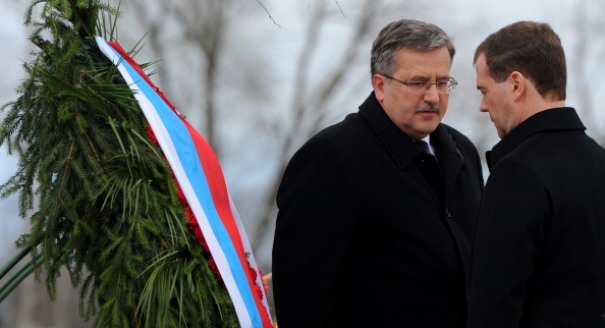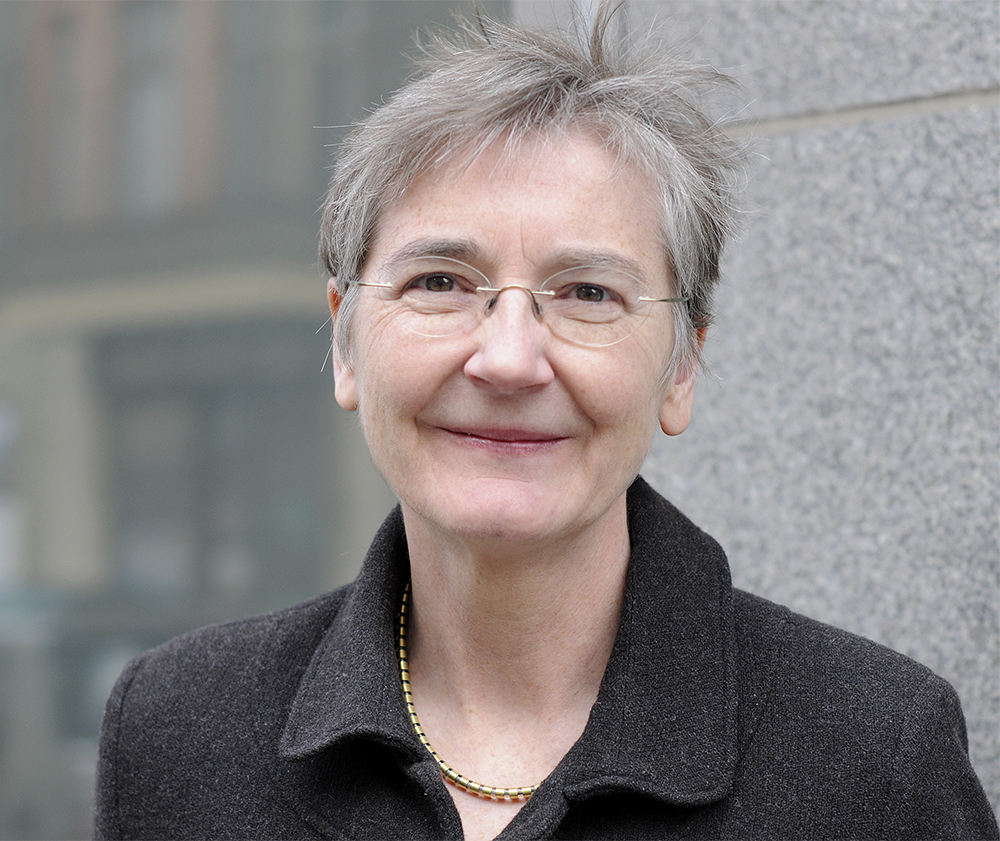Judy Dempsey
{
"authors": [
"Judy Dempsey"
],
"type": "commentary",
"blog": "Strategic Europe",
"centerAffiliationAll": "",
"centers": [
"Carnegie Endowment for International Peace",
"Carnegie Europe"
],
"collections": [
"Europe’s Eastern Neighborhood"
],
"englishNewsletterAll": "",
"nonEnglishNewsletterAll": "",
"primaryCenter": "Carnegie Europe",
"programAffiliation": "",
"programs": [],
"projects": [],
"regions": [
"Russia",
"Europe",
"Eastern Europe"
],
"topics": [
"Security",
"Foreign Policy"
]
}
Source: Getty
Grounded: Poland-Russia Relations
Five years since a Polish government aircraft crashed in western Russia, Moscow has yet to return the plane to Poland. The crash is still having political ramifications.
On April 10, 2010, a Polish government aircraft attempted to land in dense fog in Smolensk, western Russia. Lech Kaczyński, then Poland’s president, was on the plane. He was leading a delegation of the country’s military and political top brass. They were traveling to Katyn to commemorate the seventieth anniversary of the murder of 20,000 Polish officers and prisoners of war by the Soviet Union’s secret police.
While attempting to land, the plane crashed. Everyone on board was killed. Poland went into shock. There was an enormous outpouring of grief. Russia also mourned. Vladimir Putin, who was prime minister of Russia at the time, was visibly shaken. Five years on, the plane crash remains a politically sensitive issue in both Moscow and Warsaw.
The rapprochement had begun in earnest when Poland’s center-right Civic Platform party, led by Donald Tusk, now president of the European Council, won the 2007 parliamentary election.
Days after the crash, Andrzej Wajda’s monumental film Katyń was shown on Russian television. Previously, Poland’s veteran movie director had been given only limited showings in Moscow. But then Putin gave the go-ahead for the release of a movie that showed the highly complicated relations between Russia and Poland.
During the weeks and months after the Smolensk tragedy, ties between Warsaw and Moscow improved. This was despite all the anti-Russian conspiracy theories swirling around at the time—propagated mostly by the conservative Law and Justice party, headed by Jarosław Kaczyński, the president’s twin brother.
In fact, the rapprochement was so positive that Russia, Poland, and Germany worked together to open the border between Kaliningrad province, a Russian exclave, and Poland. That move allowed the inhabitants of Kaliningrad city—previously Königsberg, the capital of the former German province of East Prussia—to travel to Poland visa free. It literally provided people living in the exclave with an open door to the European Union.
Arguably, opening the frontier with Kaliningrad was one of the crowning aspects of the Polish-Russian rapprochement. Arguably, too, the step had the makings of a unique Polish-German-Russian reconciliation, often unthinkable given Poland’s justified negative experiences with Germany and Russia, the two countries that occupied or divided Poland over the centuries.
Because of the #Ukraine crisis, little remains of the Polish-Russian rapprochement.Tweet This
Today, because of the Ukraine crisis and the resulting clash between the West and Moscow, little remains of the Polish-Russian rapprochement.
Law and Justice may be vindicated. The party had consistently criticized Tusk’s moves toward warmer relations with Russia. It has used the crash and the conspiracy theories that went with it to try to discredit Civic Platform’s opening to Russia.
Details of the crash itself are still emerging. Two reports by the Polish military prosecutor’s office, one leaked as recently as April 8, revealed errors by the Polish crew. In addition, a senior general in the entourage allegedly encouraged the plane’s commander to land, despite poor visibility. There was criticism too of the air traffic control team at Smolensk.
Despite all the attempts by Poland to be open and professional about the causes of the crash, Russia has refused to return the crashed plane to Poland, for reasons never convincingly explained. By holding onto the plane, Russia seems to be playing with Polish internal politics.
The crash risks being used for political purposes in both Moscow and Warsaw. “It could be instrumentalized by Russia and by the [Polish] opposition,” said Marek Cichocki, political scientist at the Natolin European Center and former adviser to Lech Kaczyński.
Indeed. Poland is in the middle of a presidential election campaign. The incumbent Bronisław Komorowski, who is supported by the governing Civic Platform, has a comfortable lead in opinion polls over Andrzej Duda, the candidate of the Law and Justice party. The election will be held in May. Parliamentary elections will follow in September.
Duda has been careful not to use the plane crash to win votes. If anything, he has been trying to reach out to moderate voters to boost his party’s chances and show that it is more than a Euroskeptic, nationalist, and anti-Russian party. But playing the anti-Russia card cannot be ruled out.
The more Euroskeptic parties inside the EU, the greater the chance of disunity and incoherence.Tweet This
Politically, it would suit Russia if Law and Justice won either the presidency or control of the Sejm, or Polish parliament. The more Euroskeptic parties in legislatures inside the EU, the greater the chance of disunity and incoherence.
Yet the Ukraine crisis has shown that despite the differences among member states over the EU’s sanctions policy against Russia, the EU has held together. And the Ukraine crisis has made many EU countries understand the relevance of NATO, particularly since the EU cannot provide any kind of security guarantees.
So if Russia believes that by delaying the return of the crashed plane to Poland it could influence the outcome of Poland’s presidential and parliamentary elections, it could miscalculate. It’s hard to see which Polish political party is prepared to do Russia any favors.
About the Author

Nonresident Senior Fellow, Carnegie Europe
Dempsey is a nonresident senior fellow at Carnegie Europe
- Europe Needs to Hear What America is SayingCommentary
- Babiš’s Victory in Czechia Is Not a Turning Point for European PopulistsCommentary
Judy Dempsey
Recent Work
Carnegie does not take institutional positions on public policy issues; the views represented herein are those of the author(s) and do not necessarily reflect the views of Carnegie, its staff, or its trustees.
More Work from Strategic Europe
- Europe on Iran: Gone with the WindCommentary
Europe’s reaction to the war in Iran has been disunited and meek, a far cry from its previously leading role in diplomacy with Tehran. To avoid being condemned to the sidelines while escalation continues, Brussels needs to stand up for international law.
Pierre Vimont
- Taking the Pulse: Can European Defense Survive the Death of FCAS?Commentary
France and Germany’s failure to agree on the Future Combat Air System (FCAS) raises questions about European defense. Amid industrial rivalries and competing strategic cultures, what does the future of European military industrial projects look like?
Rym Momtaz, ed.
- Macron Makes France a Great Middle PowerCommentary
France has stopped clinging to notions of being a great power and is embracing the middle power moment. But Emmanuel Macron has his work cut out if he is to secure his country’s global standing before his term in office ends.
Rym Momtaz
- How Europe Can Survive the AI Labor TransitionCommentary
Integrating AI into the workplace will increase job insecurity, fundamentally reshaping labor markets. To anticipate and manage this transition, the EU must build public trust, provide training infrastructures, and establish social protections.
Amanda Coakley
- Can Europe Still Matter in Syria?Commentary
Europe’s interests in Syria extend beyond migration management, yet the EU trails behind other players in the country’s post-Assad reconstruction. To boost its influence in Damascus, the union must upgrade its commitment to ensuring regional stability.
Bianka Speidl, Hanga Horváth-Sántha










